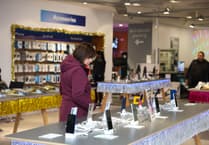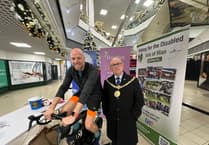I must admit, when I arrived in the island, I underestimated the task the Manx police had, and now I will forever have a new respect for the work the Isle of Man Constabulary does.
After just three months in the island, I was given the opportunity to get an inside peak at how they keep the public safe.
Inspector Gavin Callow showed me around the headquarters and allowed me to join one of his officers out on patrol around Douglas.
On arrival at the headquarters, I was given a tour of staff facilities and the many different departments involved in tackling crime.
Social media is a big part of police work now, with people reporting incidents to the police via Facebook messages and the police running campaigns to target specific areas of crime.
The officer in charge of social media will constantly check all social media for any reports of crimes, the police also make themselves more approachable to the public by replying to messages personally and updating the public on incidents through social media posts.
Next, I was taken to the dog unit to see the work man’s best friend does to help keep the community safe.
The dogs were, unfortunately, indisposed so I could not see any of the furry enforcers, but that would not be the only chance I would see the dogs in action that night.
The unit had recently finished an operation to seize criminal properties, including a large, undisclosed amount of illegal substances.
I met an officer who was cataloguing what was believed to be cocaine, which needed to be tested in the UK. I had never seen such an amount of drugs as that in my life and probably never will again.
Next on the schedule was the beating heart of the Manx emergency services, the joint control room, which is located in the police headquarters.
Co-ordination is crucial in joint operations and watching the different services work together was fascinating to see.
There is always a person at the central control desk, which allows them to oversee all calls that come through to the emergency services and direct the appropriate response team to the scene.
That person also has the difficult task of assigning priority to incidents and how quickly help can get to the call.
We then visited a place we all hope to never see, the custody wing.
There are three different types of cell at the police’s disposal, dry, juvenile/vulnerable and normal.
Normal cells have access to a toilet and an intercom for requesting assistance from officers.
After an arrest is made, the suspects are brought into the police station and given a sweatsuit to wear while their clothes are swabbed for evidence.
If a suspect presents a threat to themselves, they are given special clothes that do not tear and do not have any loose components to limit the risk they pose.
A dry cell is to hold any suspects involved in a case that is DNA-sensitive, there is no toilet to avoid the suspect washing themselves and washing any DNA evidence off themselves.
A juvenile/vulnerable cell has larger glass windows in the doors in order to make observation easier.
After finishing the tour, I was invited out to a patrol with an officer who wished to remain anonymous.
Pulling out of the station, we started to drive towards an incident that had been radioed in as we left, however, as a testament to how quickly the police respond to incidents, officers arrived on the scene before we even got out of the city centre.
I proceeded to ask the officers’ opinion on joining the police.
One said: ‘You have to be a little bit different to join the force, you have to have an unnatural inclination to help people.’
This officer was still in his probationary period,and was only 18 months into the position, but his insight into the job was very refreshing.
The officer I teamed up with for this ‘ride-along’ wanted to be a dentist when he was growing up but after working a string of office jobs decided to apply for the police as he always wanted to help people and was accepted.
He added: ‘Working for the police is like being a dentist, every mouth (day) is different, but you’re there to deal with cavities (crime).
‘You couldn’t come in and not do anything, it’s having that inquisitive mind.’
As we drove around, we checked up on people who were out for evening drives and chatted to them, just to see if they were doing alright and letting people know that the police was there if they needed help with anything.
The officer said: ‘We’re in a privileged position to help improve people’s lives without it being a criminal matter.
‘We are the community and we’re here to help each other, if I wasn’t helping the community, I’d be doing myself and the community a massive injustice.’
It’s not all catching bad guys and stopping crimes, there are many different avenues to dealing with crimes as the officer explained.
They said: ‘One minute, I have to be stern, and the next I’m passing on a death message, it’s not one tool for every job.’
Delivering a death message to family is one of the hardest parts of the job, as the officer has found out.
He said: ‘You have to be very frank it isn’t nice. You need to be very clear and concise.
‘It boils down to being a human and an anchor in the sea of chaos the family is in.
‘I’ll be somebody that person will remember for the rest of their life.’
Being a police officer also seriously affects life outside the job as well, with people looking at you and interacting with you differently.
The officer said: ‘Some of the friends I had before joining the police don’t speak to me anymore.’
The night ended with drama as I was able to see the Joint Emergency Control Room working to full capacity.
A call came in from a group following their friend in a car and were concerned for his safety in the situation.
There was limited access to the person and their vehicle but by using the main control room, they were able to find an unorthodox route.
The emergency services scrambled and co-ordinated their response to best help the affected person, who was found safe and given appropriate treatment, with the help of the dog unit which was under a lot of pressure to beat the clock to find the person before they could do any harm to themselves.
It was fascinating to see just how the different teams communicated and the different roles in the control room itself.
During my ‘ride-along’, the officer showed an attitude typical to those of the police forces I met that night, an attitude of duty and respect for the role they have in society.
This was captured perfectly by the officer I spoke to. He said: ‘If I can guarantee that I have done my job lawfully, I can sleep well at night.’




